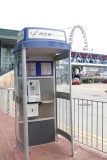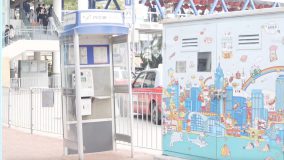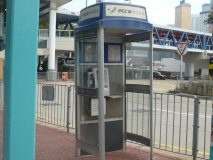Youtube link: https://youtu.be/mT7vh7bzbrE
Transcript:
J: Hello everyone, I am Joyce
W: I’m Wendy. Today we’re going to show you the Central Ferry Pier, one of the filming locations of The Mighty Peking Man. There is a memorable scene in the film Mighty Peking Man, when the gorilla arrives at Hong Kong’s Central Pier. This scene is a pivotal moment in the story, as it marks its entry into the bustling city and sets the stage for the chaos and destruction that follows. As the gorilla emerged from the surrounding buildings and approached the pier, a crowd of onlookers gathered, filled with awe, curiosity and fear. The scene is set against the backdrop of a busy waterfront, with boats docked and people going about their daily activities.
J: Here we arrived at the Central Ferry Pier, the surrounding area is very prosperous with high-rise buildings. This area really deserves to be Hong Kong’s financial centre. But when walking along the street, it always feels like something doesn’t fit in here. Will this telephone booth be abandoned in ten years?
W: Yeah. They have played an important role over the past few decades, but with the rapid development of mobile communications technology, the existence of public phone booths is worth exploring. What do you think about that?
J: Telephone booths are vanishing due to several factors when viewed from an architectural perspective. Firstly, the widespread adoption of mobile communication technology has significantly reduced the need for public telephone booths. With the convenience and ubiquity of mobile phones, individuals can easily make calls and connect with others without relying on fixed telephone booths.
W: I think the same thing. Technological advancements in communication infrastructure, such as the expansion of wireless networks and improved signal coverage, have made mobile phones the preferred choice for communication. The availability of voice calls, video calls, and instant messaging on personal devices has further diminished the relevance of telephone booths.
J: You’re right. From the economic perspective, the economic feasibility of maintaining and operating telephone booths has become questionable. With declining usage, the costs associated with upkeep and maintenance outweigh the benefits, leading to a reduction in their numbers.
W: Yet there is no denying that in the past, telephone booths served as a crucial public utility, providing a designated space for individuals to make phone calls when away from their homes or offices. They were particularly important before the widespread adoption of mobile phones, enabling people to connect with others and make important calls while on the go.
J: Even so, with the advent and ubiquity of mobile phones, their primary function as a means of making phone calls has been largely replaced. People now have the convenience of carrying their communication devices with them at all times, eliminating the need for a fixed public telephone booth.
W: Yes, but there are some special situations where telephone booths may still serve a purpose. For example, in areas with limited mobile network coverage or during emergencies when mobile services may be disrupted, telephone booths can provide a reliable means of communication. Some telephone booths have also been repurposed as Wi-Fi hotspots or charging stations for mobile devices, adapting to the changing needs of the digital age.
J: It’s right to think that way, and I’m reminded of some of the films I’ve watched where telephone booths have significance. Telephone booths served as a symbol of urban life and were often featured in popular culture, including movies, television shows, and literature. They represented a sense of privacy and a physical space dedicated solely to communication.
W: Apart from that, some suffers if the telephone booths have disappeared. People with financial difficulties, tourists and others with temporary needs will be affected. For example, some people who have just travelled to Hong Kong but have not purchased a telephone card yet. The nuisance caused by the loss of public telephone booths can be significant or neglectable. For those who are in financial difficulties and cannot afford mobile devices, the loss of telephone booths means the loss of contact with their relatives and friends, and also increases the probability of accidents.
J: Also, in certain emergencies, such as accidents, illness or other emergencies, public telephone booths can provide a means of emergency contact. If phone booths disappear, those in need of emergency help may find themselves unable to reach emergency services or other emergency relief organisations in a timely manner. But I don’t think the vanishing of public phone booths is a big problem for tourists, as there are many other ways to get in touch, such as going to 711 and purchasing a phone card directly or using WeChat to get in touch after using the public network, and so on.
W: Yes. All in all, the disappearance of public telephone booths may have a negative impact on some disadvantaged groups, increasing their sense of isolation, confusion and inconvenience. So what measures do you think should be implemented in response to their disappearance?
J: The first thing to do is promoting mobile communication technologies: Increase access to mobile phones and the Internet so that people can communicate more easily using their own mobile phones. This may require multi-party cooperation between governments, telecom operators and non-profit organisations, among others, to ensure that more people have access to mobile communication technologies through the provision of affordable mobile phones and communication services. What about you?
W: Another way is to provide free public Wi-Fi: In lieu of public telephone booths, free Wi-Fi services can be provided in some public places to enable people to use their own mobile phones for voice calls or online communications. This can make up for the function of public telephone booths and meet people’s communication needs. Also, providing alternative emergency contacts is effective. In emergencies, ensure that people have alternative emergency contacts, such as emergency telephone hotlines or emergency contact equipment in public places. This will ensure that people are able to seek help in the event of an emergency.
J: That’s all for our sharing.
W: Thank you for listening.
five still photos:





—- Jiang Ziyan 3036264602; Wang Yi 3036268024